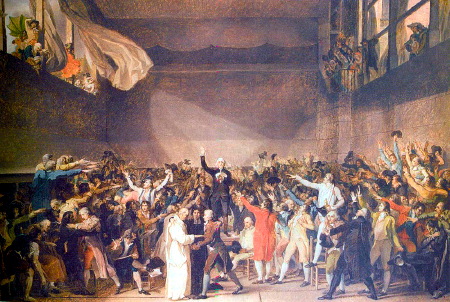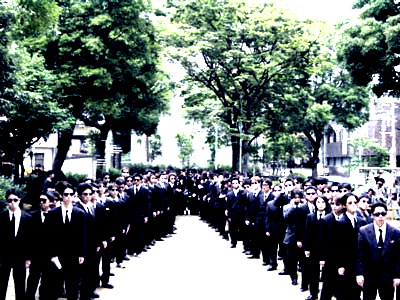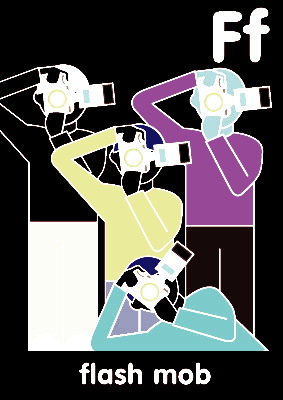Over on Scobleizer, Robert Scoble is throwing down some analysis on malleable social graphs and mini-mobs after witnessing the social media infiltration of SXSW. He is primarily interested in check-in locative services such as Foursquare and Gowalla that recommend to the mobile user useful services and businesses based upon aggregated social metrics. To the Web 2.0 economics crowd, Scoble suggests that Facebook has the potential to sweep the locative market based upon its infodemographic storehouse. Facebook’s accumulated social metrics of associations, networks, fan clubs, likes and dislikes can form locative-informed “malleable social graphs.” For example, if I want to go see Off Broadway theater in NYC, I check-in to FB’s locative service and it puts me in touch with friends (or friends-of-friends) with similar interests in the area (along with businesses, locations, services, and so on). Point being, through localized search criteria I see what I want to see based upon the service already knowing the aggregates of my interests and indexing that to my location (as revealed through social metrics I have given such services and from which such social metrics algorithms have deduced — i.e. Amazon’s “you might also like…” suggestions).
While malleable social graphing evidently requires forgetting all about the privacy of location (as the Please Rob Me project exploits) as well as the handing-over of multiple indexes of tastes (including all kinds of social metrics), making such a locative service the dream of surveillance and security organisations everywhere (governmental or not), there is a more substantial problem with a malleable social graph and the resulting embodiment of what Scobles calls “mini-mobs” — can you guess the potential consequences?
(Aside on mini-mobs: these are really just small groups of friends with similar tastes, what in highschool everyone knew as a clique — save that, in this case, an infotechnical apparatus has told you whom your friends are. Perhaps this could also be called an affinity group, but in a way in which, again, an all-seeing infobot has determined one’s allegiances.)
SMALL MOBS, BIG CONSEQUENCES?
For what happens when the concept of malleable social graphs and mini-mobs are applied to filtering information about the conditions of life in general? To the arc of learning? To political decision-making? To the conditions of forming a choice based upon knowledge of the negative?
Evidently, in the example above, I will possibly never find myself out at a new theater location in Brooklyn, or heavens, the Bronx. But what happens when malleable social graphs are used to filter and read the info-organisation of governance, moderate the discussion and resolution of difference, and filter the freedom of the press (and the demand of representative politics that one be exposed to that which one might oppose)? The filtration of otherness threatens to turn “mini-mobs” of like interests into walled gardens of veiled ignorance:
3. Check into politics. I told Facebook that I’m a liberal Democrat. So why am I still seeing Republican crap in my news feed? Facebook hasn’t implemented malleable social graphs yet and, so, its newsfeed is still presenting information to me that I might not care about and, in some cases, might actually make me angry. (Scobles)
With this desire, the infominiaturization of technics encloses information into already-approved symbolic codes. With some irony, social metrics algorithms follow, at base, the structure of a limited binary 0/1 system that ever since the Turing Machine creative engineers have been trying to render organic, produce the maybe, the perchance, the random event, the suggestion and the inference. Even when algorithms of suggestion are in place (based upon what are still crude indexes of probability), why, in this case, does the human mindset desire to exclude potential random encounters and live within already-known variables? Nothing to produce angry affect allowed. Is this merely an American-Democrat sentiment? Or is this not the underlying technico-ontology of social media? Or, to put it after Bourdieu, is this the technical habitus of social media, where habits, once registered, are taken as a priori conditions for all further lived experience, for the habitus itself as that which links social structures to social practices?
US Republicans might feed on the opposite strategy, as demonstrated by Brian Massumi in Parables for the Virtual. Feed the reactionary right content they don’t like (usually with TV) and it makes them angry. Affect breeds affect; gun-toting tea parties result. But for Scobles (as subject-Democrat), he appears frustrated that supposedly neutral technologies (which he desires to be not neutral per se but pre-ordained) still allows him to read into a world which he’d rather exclude (and may I add, at his – and his party’s – peril). By not engaging with the opposite spectrum of representative politics in a two-party system, the balance of representative politics is upended. Viva the walled garden! — and all the risks of factionary violence based in ignorance. According to Simon Schama, similar conditions were at stake in critical stages of the French Revolution where sectarian ignorance was used to mobilize mass mob violence (the “famine plot” of the aristocracy – which never existed – was elevated into a paranoid witch hunt for “enemies of the people”). This is how the relatively small cabal culled from the Jacobins instituted the Reign of Terror: by elevating the ignorance of the mini-mob into the law of all.
In the 21C, the mini-mob enframing of technics appears to eliminate debate and introduce the monotony of comfort. The desire here is to translate (like Rousseau) the affect of difference into auto-affection (self-masturbatory infofeeds, self-affective symbolic pleasure: a mini-General-Will). Rousseau was well aware of this problem:
He who imagines nothing sense no-one but himself; he is alone in the midst of humankind. (Rousseau, Essay on the Origin of Languages)
What makes the social media subject frustrated (if not angry) is not that unwanted content exists (thus provoking remedies and strategies to combat / negotiate), but that the means of delivery keeps delivering “unwanted” content. Shoot the messenger. Social technics is supposed to always already know my desires. It falls into the wrong when it fails to do so. In its place, I want a god of technics, a theotechnics: it knows where I am and what I want, so I never have to know or discover anything for myself. When the unwanted intrudes upon the carefully wrought culture of my mini-mob, technics is at fault, not the differentiation of politico-ontology. In this respect, the malleable social graph anticipates the incommensurable factions of an infotarian state. Such factions, ideally, would be kept in ignorant bliss by the coordination of the infolocative apparatus which would keep the opposed away (from each other).
UNMALLEABLE MOB MENTALITY
So, if mobs are bad but small mobs are good, well, then we need to encourage the production of these new, mini-mobs. (Scobles)
The issue stated precisely. The large assemblage – the multitude – is always a danger when the homogeneity of agreed values is sought. The multitude includes those whom should be (technically) excluded. The mini-mob can be more easily controlled, managed, maintained. It is stress-free engagement with the world. All of my choices are pre-ordained. I can now live under the reassurances of a technics of fate that I will never encounter anything I have not already thought of or experienced. In a mini-mob, the infofeed can be made to agree with itself, spiral into-control through info-control (rather than out-of-control). The mini-mob always agrees with itself. It must, by definition. The production of mini-mobs is the technical exclusion of politics itself.
FROM THE COMMENTS
The problem could be though: if you’re always in mini-mobs based on similar tastes, how strong can your opinions be? If stating “Avatar was awesome” gets you universal adulation, how well is that argument going to hold up against someone who’s studied it enough to pick apart the writing, acting, plot, and so on. Constantly surrounding yourself with people who agree with you isn’t without risk, because if you’re not having your ideas challenged, then you never have any incentive to really think them through and develop your points. (Brian Alkerton)
Yes.
./..
Tags: fear, mini-mob, social media, technics
.tinyUrl for this post: | https://tinyurl.com/yyn3ahro .







 RT
RT 
[…] This post was mentioned on Twitter by Dark Politricks RT, tobias c. van Veen. tobias c. van Veen said: Unmalleable Mob Mentality: the technical exclusion of politics « fugitive philosophy http://bit.ly/92eLxL #scobilizer #minimobs #socialmedia […]
Real philosophical dialogue about the implications of social media and the automation of human relationships is all too rare, so on that note, thanks for this post! Geek culture (or can we just call it Consumer Culture?) holds the idea of automation as a central theme in all valuation. This culture is an assimilation of extopianism, new-agey fantasy and rampant political and critical ignorance. Mini-mobs, (brands, tribes, etc.) represent mini-markets that operate under the illusion that they are demanding something more of the market than gift wrapping paper. By outsourcing basic human experience, like chance, relationships, getting lost, etc. people resign themselves to operating under the delusion that by taking the suggestions provided them by social media is not an educated decision, it is not a decision at all. The subject has not taken a stance acknowledging the negative in choosing (making a positive). Instead, they simply, for lack of a better phrase, walked down the beaten path. What is most alarming to me, however, is that despite this path’s association to all sorts of “people” (fans, friend etc.) it was not beaten by a person at all, these trails are blazed by algorithms.
Thanks for writing. I’ve been checking out Scilogue — added it to the blogroll — some good content up there. I just edited the post a bit in light of further reflections, brought on in part from your response here which says in much more succinct terms what I threw out this morning (some posts are worked out more than others: this one was not).
Many ideas here: outsourcing basic human experience, the loss of being-lost, a generalized fear of choice without extraneous info, an infantilization of urban existence (my mobile holds my hand).
And yes, strictly, there is no choice made when algorithms enframe or as you put it, blaze the trail ahead so that any possible “choice” is just that, a possibilized-choice. Of course this is somewhat unintuitive, as one would expect that the more information one has the better chance one has of making an “informed choice.” But now the question isn’t of the bias, reliability or value of the information, but of its already-tailored qualities, of its algorithmic enclosure. “Information” presents itself as universal when it has been rendered particular.
We’ve entered Philip K Dick territory.
If you dug this post, you’ll probably appreciate the discussion around “social media & its discontents.” A bit more pragmatic, but it provides something of the evidential analysis for these more philosophical notes in regards to social media “coverage” of the 2010 Olympics.
http://fugitive.quadrantcrossing.org/?p=340
Unmalleable Mob Mentality: the technical exclusion of politics « fugitive philosophy http://bit.ly/92eLxL #scobilizer #minimobs #socialmedia
RT @fugitivephilo Unmalleable Mob Mentality: the technical exclusion of politics « fugitive philosophy http://bit.ly/92eLxL #scobilizer #mi
Unmalleable Mob Mentality: the technical exclusion of politics « [] http://bit.ly/92eLxL /via @fugitivephilo yes.
RT @fugitivephilo: Unmalleable Mob Mentality: the technical exclusion of politics « fugitive philosophy http://bit.ly/92eLxL #scobilizer #minimobs #socialmedia
RT @justonlyjohn: Unmalleable Mob Mentality: the technical exclusion of politics « [] http://bit.ly/92eLxL /via @fugitivephilo yes.
RT @fugitivephilo Unmalleable Mob Mentality: the technical exclusion of politics « fugitive philosophy http://bit.ly/92eLxL #socialmedia
more on location tracking, common interests and enabling mobs – http://bit.ly/92eLxL #fb
Eli Pariser: beware online “filter bubbles” — TEDX talk says basically the same thing in more elegant terms — http://www.youtube.com/watch?v=B8ofWFx525s